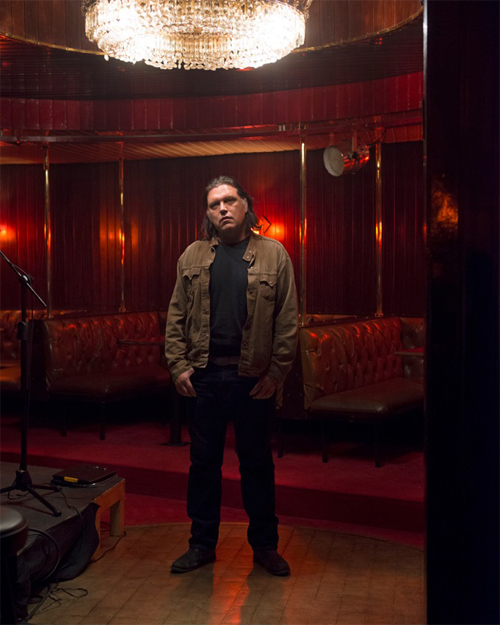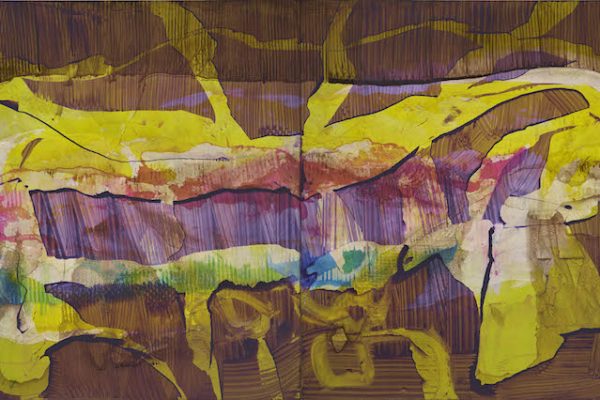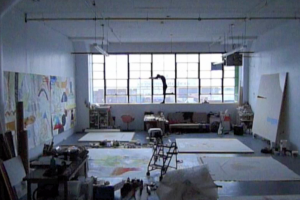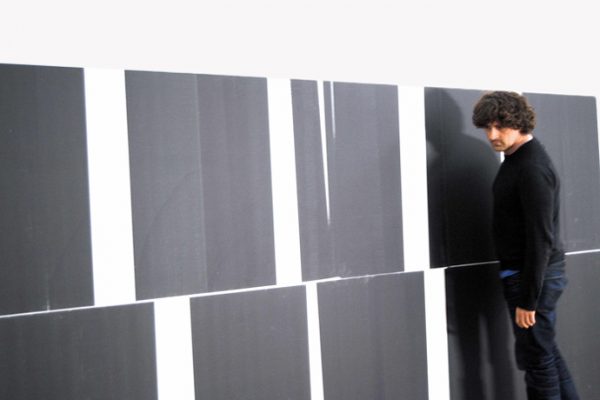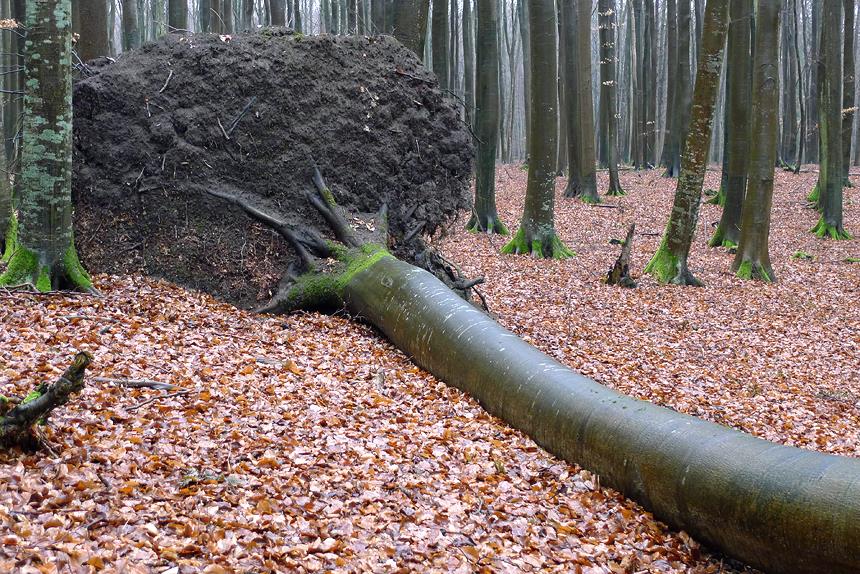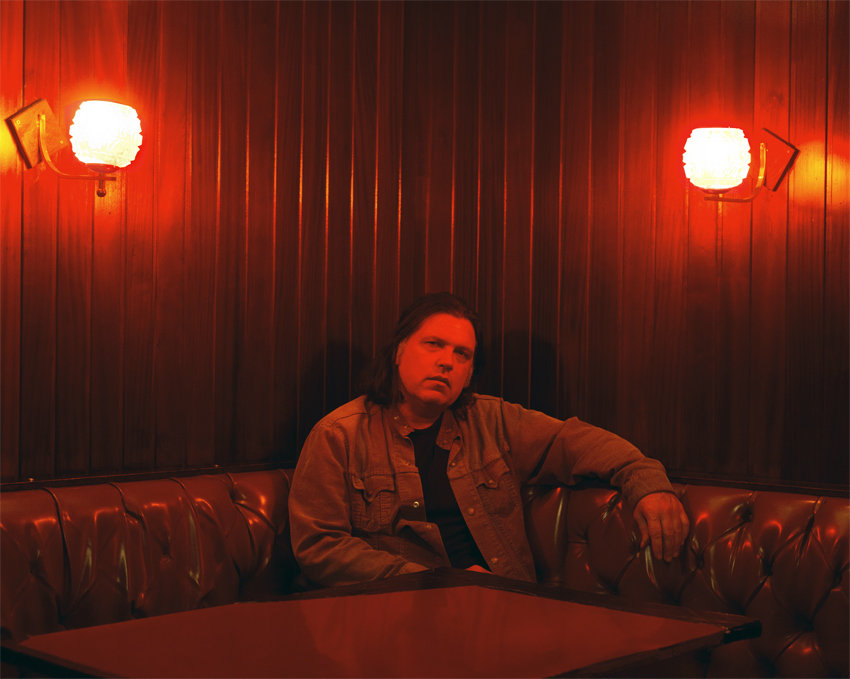
Richard Buckner
by Mark von Schlegell (photos: Albrecht Fuchs)
An improbable number of rock notables and rarities come through Cologne’s jewel-like King Georg Klubbar. A stop at this ex-brothel offers a room for the night between various other major destinations (Paris, Brussels, Amsterdam) and Berlin, and a chance to get back to the old school basics of bar-room performance. In the last year alone the tiny club has hosted first-rate shows by the likes of Kim Gordon, Shonen Knife, Ed Askew and James McNew. I first became aware of Richard Buckner in a lifetime far away, when I heard his 2000 album The Hill: an experimental folk-rock/literature fusion built off the poems of Edgar Lee Masters. Since then I have explored many of this North American singer songwriter’s ten other records. But on this quiet Thursday, Dec 12., it seemed somehow surreal that I would first see him play in Cologne… — mvs
The first question I managed to ask musician Richard Buckner over dinner (and his first Kölsch beer since the 90s) was: „What do you think of the state of rock criticism today?“
„…You’re serious?“
Double-taking between laughter and tears, he chose the former and returned to his noodles. Despite an often apocalyptic vision of contemporary reality (rock criticism included) Mr. Buckner radiated a stoical good humor into Germany, showing something of the stunned U.S. resiliency of Thomas Pynchon’s Tyrone Slothrop.
Perhaps partially to his own surprise, Mr. Buckner’s existence has taken newly comic tones since the return from a near abyss of quitting professional music altogether his 2011 release Our Blood signified. Alienated by the new Brooklyn, he had moved to Kingston NY to make that album, but lost the final recording when his house was burgled. Forced to work on a road crew to get by, his life became like something out of a David Goodis novel as he found himself prime suspect in a local murder case he knew nothing about.
Buckner’s views of the current state of U.S. culture are no cheerier than those of rock criticism. „We’re incredibly poor. The whole system is broken. It’s over.“ As if gathering only the remaining beauties of this emptiness, his latest release, 2013’s uncompromising Surrounded, is a sort of Purgatory in a Dante-esque trilogy — with Our Blood the Inferno, and 2006’s Meadow the minimalist Paradise.
Yet it was evident at King Georg that Mr. Buckner has come through the other side of the capitalist circle of death. Kingston NY remains his increasingly happy home. Engaged in a continually relevant relationship with a yarnmaker, writing and recording new uncompromising music on his home 24-track studio, he has discovered a new kind of post-economy. For one thing with rock as we knew it basically dead, after twenty years of writing songs, playing and touring, Buckner himself is alive, and like Ishmael on his coffin can find himself carried by the real-world buoyancy of the past.
In March, North Caroline’s stalwart indie label Merge Records is going to celebrate Richard Buckner’s first album (named from a lyric of „Gauzy Dress“) by releasing a 20th anniversary edition of Bloomed (1994) on vinyl with a bonus disc of radio performances, and an early live bar recording of The Doubters, his old band.
Tucker Martine, one of the world’s busiest producers, found the time to mix Surrounded on the side. Other fans have started businesses to organize tours through North American living rooms, tours that are helping create new models for other artists as well. Peter Scheiffele, who booked Mr. Buckner for King Georg (one of only two visits to Germany this year) has been a committed fan since he heard Buckner’s first ever cut: a live version of Gauzy Dress in the Sun by The Doubters from a 1992 compilation. Mr. Buckner marveled to hear that recording again, and reminisced about those days in San Francisco, particularly a mythical Ryan Rosenberg, who seemed to need to do nothing in the world but once in a while put on a shirt and play pedal-steel guitar incredibly well.
„I’m happy I saw the reality of things in the U.S. in the last years,“ Buckner said. „I know I’m lucky to have what I do.“ He was clutching his compact and lightweight 1970s Kalamazoo guitar – „made from plywood, for poor people.“ He’d brought the instrument back from dead after it had broken in two, and it was all he’d taken for the tour. He has given up the loop station and effects pedals with which he’d surrounded himself of late, and prefers to play pure acoustic. „Every show became a labyrinth,“ he said. „I kept getting lost.“
Yet the edge of the labyrinth is still near. In the intimate conditions of King Georg, 2013’s Richard Buckner gave a of riveting, hypnotic performance, more Lydia Davis (his all-time favorite writer) than Hubert Selby Jr. (he’s currently reading The Willow Tree). A vivid minimal beauty emerged from the tonal and rhythmic complexity of his finger-picking. Though it was impossible not to realize one was in the presence of nature, there was something else in the room as well. The large bear-like singer, grasping the lyre-sized instrument, screwed up his eyes with Homeric intensity, as he raised up his old story songs and set them to life amid the more fragmented POV studies of recent records. The Kalamazoo gleams with a big silver pickup that stands for rock n roll, and by virtue of Mr. Buckner’s versatile picking produces a live sound reminiscent of the old Harry Smith anthology, those times when the string acoustic instrument sounds as mechanical as any synthesizer. His performance raised ghosts both ancient and modern.
„I think I’ll start smoking again,“ he said after the show and actually did, though I think it was just to stand outside with the Canadians, two of whom were heading the next day to Alberta, from where he once hailed. A born traveler (his pick-up truck is currently at 610,000 miles) Mr. Buckner points to his parents to explain his comfort with the road. Describing them as hopelessly romantic alcoholic red-necks, breaking up and getting back together all across North America — towing Richard and his little sister along behind — he raised up characters as if from out of his songs.
A despiser of Reaganomics and all it has wrought, a lover and extremist fan of all sorts of bands and types of music (he praised the Go-Betweens, the Pastels, Young Marble Giants and the Fall; and agreed this years Cologne WEEK-END FEST had one of the greatest line-ups ever), Buckner still is more a creature of the 80’s than his music might suggest. Over dinner he all but derided his own fan-beloved 1998 Devotion + Doubt as sentimental. But he turned to it repeatedly during the performance, going so far as to give a pulled-back and all the more affecting a capella „Fader“ as a dramatic closer. It is remarkable how with „1985,“ the key lyric of „Little Wallet Picture“ as he sings and plays it again in Cologne 2013, the storyteller still refuses to let go — indeed remains more obsessed than ever.
Buckner continues to experiment with rock and literature fusions. Surrounded’s liner notes show how the ambiguous lyrics have emerged from a prose narrative. We may expect to see more of him in print one of these days. Meanwhile, for those who caught the King Georg show, Richard Buckner remains one of those artists whose continued production baffles the times: rock lives, barely or not.
„That’s what these young fuckers need,“ I heard him counsel Stefan Müller of Süd. „I want to see darkness in their eyes!“

